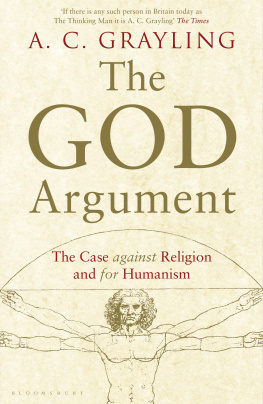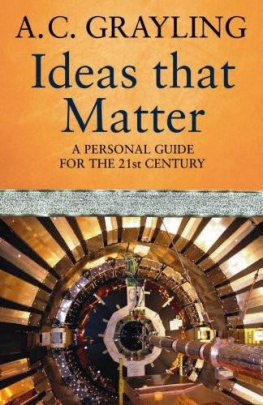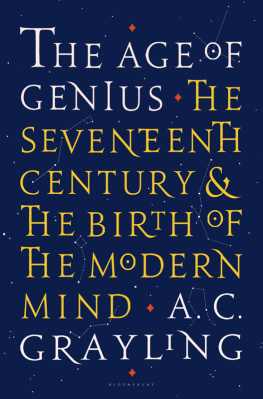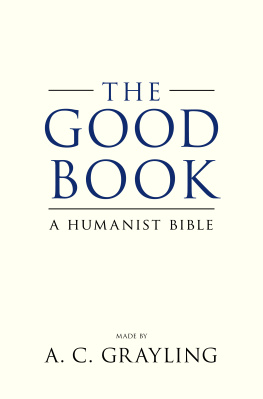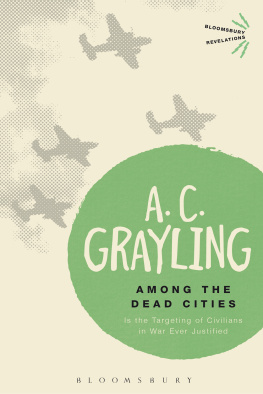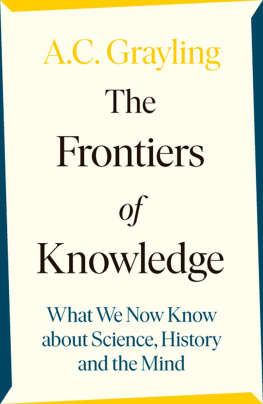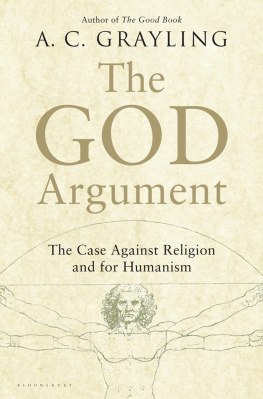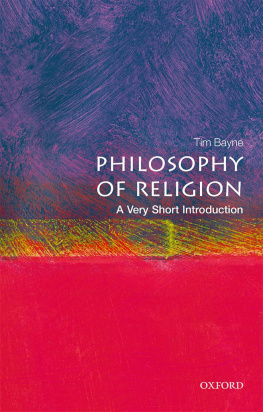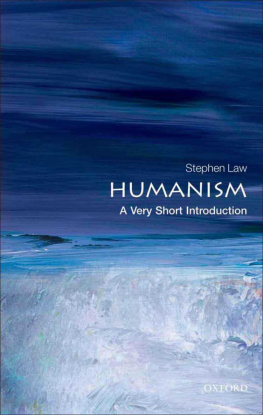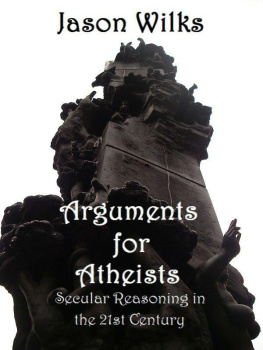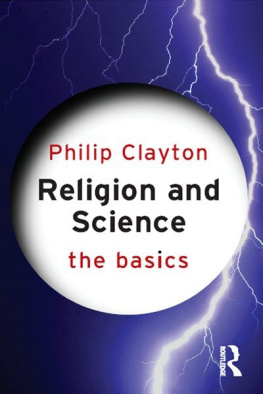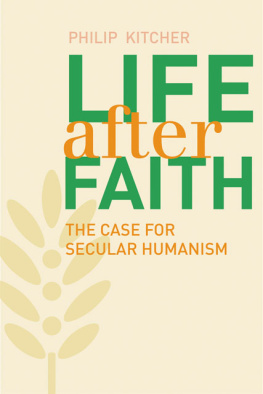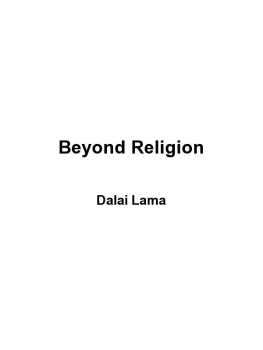We learn from example as much as from study. My thanks go to colleagues and fellows in the cause: Andrew Copson, Richard Dawkins, Daniel Dennett, Derren Brown, Steven Pinker, Robin Ince, Sam Harris, Keith PorteousWood, Terry Sanderson, Roy Brown, Leo Igwe, Peter Cave and many others whose views and contributions have variously provided instruction or enjoyment or both. During the writing of this book the world lost two eloquent and forceful comrades in the task, Paul Kurtz and Christopher Hitchens. The latters lost is personally felt.
Every generation thinks it travels an especially difficult road, and in one good sense that is true: for every generation must travel its own road, but with the hope of arriving at a destination further along than its predecessors. The hope in this case is that our contributions will each add their inches to that forward motion, and that one day there will be arrival. With so many people like those named making their contributions, perhaps that day is no longer distant.
The final draft of what follows was revised in the beauty and tranquillity of Le Radicchie near San Donato under the Tuscan sun, courtesy of Melanie and Piers Gibson, whose hospitable good company is very warmly acknowledged.
As always, thanks beyond words go to Katie Hickman, sine quo non .
A. C. Grayling is Professor of Philosophy at and Master of the New College of the Humanities, London. He believes that philosophy should take an active, useful role in society and is a prolific author, whose books include philosophy, ethics, biography, history, drama and essays. He has been a regular contributor to The Times , Financial Times , Observer , Independent on Sunday , Economist , Literary Review , New Statesman and Prospect, and is a frequent and popular contributor to radio and television programmes, including Newsnight , Today , In Our Time , Start the Week and CNN News . Among his recent books are Towards the Light: The Story of the Struggle for Liberty and Rights that Made the Modern West, Liberty in the Age of Terror and The Good Book: A Secular Bible .
To put matters at their simplest, the major reason for the continuance of religious belief in a world which might otherwise have long moved beyond it, is indoctrination of children before they reach the age of reason, together with all or some combination of social pressure to conform, social reinforcement of religious institutions and traditions, emotion, and (it has to be said) ignorance of science, of psychology, of history in general, and of the history and actual doctrines of religions themselves.
This statement doubtless sounds polemical, but that is not the intention; rather, it is a setting out of considered facts, each discussed later in these pages. They are important facts, because understanding them is essential to solving one of the worlds greatest problems: how to free the mind of humankind from attitudes and practices which are among the biggest impediments to peace and human progress, and to adopt in their place the humane outlook that is seriously concerned to promote both, and has a real chance of doing it.
In the Introduction it was acknowledged that religious belief can serve as a comfort, guide and inspiration when benign, while stating the less comfortable and larger truth that religion is far too often a form of enslavement, mental and even literal, and a source of harm from which the world needs liberation. Whereas there are other sources of individual comfort and inspiration that are far better than religion they include love and friendship, family life, art, the pursuit of knowledge and, as noted, the outlook and principles of humanism there are very few sources of conflict and mental enslavement as bad as an ideology which demands self-abnegation by submission to its dogmas and to the self-appointed interpreters of its dogmas. Religion is the paradigm of this.
So the argument cannot be that the world needs to rid itself of bad religion in order to promote good religion in its stead, for alas history and contemporary affairs overwhelmingly teach a different lesson. What tries to be good or moderate religion is invariably a faint version of its official self, existing only when its votaries have rejected most of the doctrines and practices associated with it. To make a moderate version of their religion they cherry-pick the bits they can live with: the moment anything more serious in the way of commitment and belief enters the frame, threats immediately arise to women, gays, human rights, peace itself and this whether you are in the Christian southern states of the United States, Jewish ultra-Orthodox settlements in the Palestinian territories, or Muslim-majority countries or communities anywhere in the world. True versions of these religions are by their nature fundamentalist, while moderate versions of religions are temporisations; the path from the latter to the former is short for anyone on whom the enthusiasms of faith take a grip.
Accordingly, when we engage with the reasons for the survival of what is essentially a stone-age outlook in the modern world, it is difficult not to sound polemical; but this is chiefly because the first step in properly discussing religion requires plain speaking and plain speaking naturally enough sounds harsh when it is about something that for very many centuries has protected itself from scrutiny and challenge by demanding uncritical deference and respect, and too often by hiding behind a smokescreen of what are claimed to be sacred mysteries.
The sophisticated apparatuses of worldwide religious organisations, the polysyllabic treatises of theologians, and the huge congregations of megachurches chanting ecstatically and holding their hands aloft, give the impression that there must be something more significant at the basis of religions continuance in the world indeed, a god, or more accurately an entire other reality, a non-material universe according to some views filled with divine beings, saints, angels and demons.
For religious apologists, assuming or asserting the existence of a supernatural agency in the universe, and moreover one that is interested in human beings on this planet, is the basis they claim for the phenomenon of religion. On this view religion is a response to a transcendent fact, the existence of that other supposed reality containing at least one supernatural being.
The alternative view, the view of religions critics, is that religions are man-made affairs, their roots in early human experience, with all the consequences of this for the metaphysics and morality constituting them. On this view it is no surprise that religion is at odds with so much of what has happened in history and the world today. From this tension comes much harm, to individuals and societies both. Given that the case against religion is an overwhelming one, freeing the world from its influence has to be an urgent goal, however difficult it might seem to achieve.
The first step is to introduce some clarity into the concepts we are dealing with, and to put them into perspective.
Given that the word religion is used to denote such a wide range of phenomena, we have to identify firm central examples. Obvious and unequivocal candidates are Judaism, Christianity, Islam and the various aspects of what British colonial authorities in nineteenth-century India chose to call Hinduism.
We have to be similarly firm in distinguishing between outlooks and practices that are properly called religions and those that are in fact not religions but philosophies. This is a very important distinction, and one that is widely overlooked. Thus, Buddhism in its original form, and still in the Theravada (Small Vehicle) form, is a philosophy, not a religion. So is Jainism, so most emphatically is Confucianism. The differentiator is that these philosophies are not centred upon belief in, worship of, and obedience to a deity or deities, from whom or from which come the commands that construct the correct form of life and belief for the devotee.
Next page
